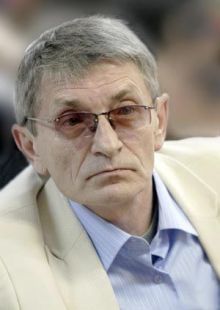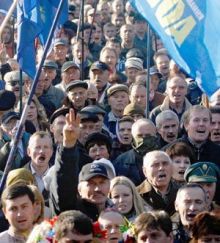The election campaign is in the homestretch now, with less than one week left until voting day. This is the first time in recent history that local elections have been held separately from the parliamentary ones. This specific election will show if Ukrainian parties are prepared for an ideological struggle and fighting for their principles on a local level. Another distinctive feature of this election is that it has for the first time combined the proportional representation and majority voting systems: one half of legislators on the local level is elected from party lists while the other half is picked in single-seat electoral districts, although only local party organizations can be nominated in these districts.
Even today it is already evident that on the nation-wide scale, the election will be won by the ruling Party of Regions. It is clear that in the south-east this victory will be overwhelming. However, the situation is not so set in stone, as the Strong Ukraine party is also doing well in that area. Thus one can say that Tihipko’s party is becoming the second most influential political power in the region.
Although Hennadii Kernes, the PoR nominee, is formally a leader in the race for the mayor’s seat in Kharkiv, he is only two percent ahead of Batkivshchyna’s Arsen Avakov. In Odesa, there has been a fierce struggle between Eduard Hurvits (supported by Arsenii Yatseniuk) and Oleksii Kostusiev (a PoR nominee). In Donetsk and Luhansk oblasts, and in the Crimea, the Party of Regions is an indisputable leader.
The situation in western Ukraine is much more interesting. It has always been more variegated and competitive than in the east. And it looks like we are set for an upcoming sensation. Today, Batkivshchyna’s major rival in this region is the nationalistic Freedom. Some experts have already dubbed this election “Tiahnybok’s heyday.”
“The recent sociological surveys show that [Tymoshenko] is being slowly, yet steadily pushed out of the opposition mainstream by Oleh Tiahnybok. Even in this election, he is going to beat Tymoshenko in at least three western oblasts,” writes Dmytro Vydrin, deputy secretary of the National Security and Defense Council (RNBO), in his column in Kyivpost.
Those “three oblasts” are Lviv, Ivano-Frankivsk, and Ternopil. However, Tiahnybok himself is planning to go beyond the boundaries of western Ukraine. “After this election, we expect to have factions in oblast legislatures in Kyiv, Chernihiv, Sumy, Zhytomyr, Volhynia, and Rivne,” he said at an Internet conference at Liga.
What is the reason for the nationalists’ breakthrough? There are several factors at work. First of all, the crisis in Batkivshchyna, in particular the situation in Lviv oblast. As we know, the local party organization has several clones. People who have nothing to do with Batkivshchyna are campaigning under its banners.
Another factor is ideology. The radicalism of Freedom, alongside with its proactive stand, fulfills the political expectations of western Ukrainian voters.
“Tiahnybok has principles of his own, and he has always stuck to them,” muses Taras Chornovil, MP, in a conversation with The Day. “I think it is not a matter of the voters’ radicalism. It just turned out that no one else but Tiahnybok suits this electoral group.
“A considerable part of society is nationalistically oriented. Meanwhile, nationalism is not in the least an anti-human or evil ideology. And this ideology has to have its own political leaders. The only thing is that Tiahnybok would have achieved a lot more if he had thoroughly filtered out everything that can be interpreted as chauvinism. If he purged his party of it, I think he would do a great job.”
Volodymyr Fesenko, director of Kyiv Horshenin Institute, believes that Freedom has good chances to win in three oblasts. The question is if they will be able to form a majority, and who they will unite with.
“In reality, the situation is both more complicated and more controversial. Freedom has the highest ratings [in a long time] at the local level. However, when asked about their preferences in parliamentary or presidential elections, voters tend to show less support to Freedom than in the local elections.”
Meanwhile, it has long been rumored that Freedom is being financially supported by Bankova Street [where the president’s residence is located – Ed.]. Tiahnybok personally rejects all accusations of being sponsored by his political foes.
“I officially declare that formally we do not depend on anyone. In my opinion, we have very competently organized the funding of our party. We created a so-called economic council, a sort of hobby club for entrepreneurs, representatives of small and middle businesses, who are members or supporters of our party. So we can manage somehow,” maintains the leader of Freedom. And sociological data shows that so far Galician voters would rather believe Tiahnybok’s arguments.
Now comes the million dollar question: “What can such regional radicalization result in?” Basically, all experts agree that this phenomenon promises nothing good. Radicalization has always been the result of a region’s problems. The major problem for western Ukrainian voters is that the power is now in the hands of political forces with an absolutely alien ideology. Tiahnybok is their reaction to Yanukovych, a sort of “our answer to Chamberlain.” However, Yevhen Holovakha, a well-known sociologist, is convinced that there is nothing to worry about. There is no particular danger for the country in such an expression of popular will.
“It seems to me that Freedom is rather a demonstratively radical force. I cannot see any real fanatics there. What is the major threat of radicalization? Riots and incidents… Yet my experience shows that the central government tends to agree to a compromise if it sees that the situation is getting extremely tense. Personally, I do not believe that Freedom’s relative victory in this election can result in any domestic destabilization. After all, they are not going to have an overwhelming majority. Other political powers, much less radical, will also get seats on the local level.
“How they are going to interact, this is a horse of another color. Ours is a very strange opposition. It cannot cooperate at all. That’s the trouble! National democrats turn out to be total losers. Even BYuT seems to be a loser because of this massive flight!” deplored the sociologist as he spoke with The Day.
Yatseniuk is the third claimant to leadership in the region. However, experts note that the rating of his political force has not been growing. Indeed, it has frozen at seven to eight percent. Nevertheless, in comparison to other political forces, this is quite a decent result.
The most striking thing is the stagnation of the once powerful party Our Ukraine, which hardly cleared the three-percent barrier. Well, every time has its heroes. Ours has the opposite poles of one and the same whole, Yanukovych and… Tiahnybok.








